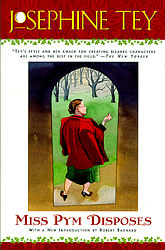
I have to admit to feeling slightly disappointed with this novel initially, even though upon reflection I realize it has certain undeniable strengths. When I finished it, I was left with the same empty feeling I get after reading P.D. James. That is, the killer is just incredibly obvious that the conclusion is an anti-climax. But then I have to wonder what point I’m missing. Is it that the characters aer more important than plot? Atmosphere? Or is it really not a big deal that nothing much happens (aside from one little murder)?
I also have a problem with the pacing of this novel. The murder doesn’t happen until the final third of the book. Most of it is spent describing the girls and the college itself, and there are several anecdotes and interludes that feel downright pointless. I’m not looking for formula here, but where exactly is the mystery?
Perhaps I should take a looser approach to this as a genre novel, and just enjoy it as a character study with a slight twist at the end. I have to admit that the there were a few moments of suspense, which were quite well-done, but the finale couldn’t match the build-up. The end felt quite rushed, just as the beginning felt too languorous. I wouldn’t be at all surprised to find out that Miss Pym was written in one shot, from beginning to end, with no planning beforehand.
There is something to be said for good pacing and strucutre – and no, I repeat, I am not looking for formula here, but there is a proper way to tell a story, and it’s not to drag everything out at the beginning and pile it all on in a hurry at the end – and Miss Pym feels poorly planned. Also, her psychological "theories" were incredibly shallow and unenlightening, and her little comments on face-reading drove me mad. (I’m surprised phrenology didn’t enter into it at some point. And her little self-aware comments about how face-reading is not much in fashion among the intelligentsia, didn’t really do much to lessen my annoyance). I was saddened because this is supposed to be some kinda masterpiece, and because The Franchise Affair was so unbelievably amazing.
But I keep scolding myself for feeling this way. I guess the point of the book is not so much to have a puzzle and solve it, obviously, but to let it soak into to you – all that atmosphere, rather – and partake in Miss Pym’s speculating about the nature of each girl. And then again there’s the idea that reading people’s characters (and faces!) might be dead wrong. Pym often said, "As a psychologist, I’m a very good teacher of French." Alright, she was an endearing character, I will admit. And her sometimes-wistful mid-life spinsterhood was most charming. She said at one point that she wished she’d met someone dashing in her youth instead of old Alan with his Adam’s apple and his holey socks. And I will admit that the girls and teachers in the story was very much alive. Alright, Tey definitely has it going on.
I just had some trouble with the pacing and then of course the "mystery" was no mystery at all, and in fact might qualify as one of the most obvious motive/suspect pairings I’ve yet seen. And Miss Pym’s interior monologues got awfully repetitive I hate to say. But the idea of her disposing is really at the center of the book, and that’s the core idea – can a person witness and cover up a crime in good conscience if it is for a greater good? Pym covers up a little cheating by a student when she is invigilating an exam and then falls into temptation again when she obtains some information about the murder that could be very helpful in the right (or wrong?) hands. Another character in the book is also faced with a similar dilemma. When is it best to let things fall where they lie? And where lies the moral core in justice – and is it always infallible? These are questions that go beyond the plot, and are intriguing to any lover of the genre, which often simplifies right and wrong, good and evil, criminal and cop, and imagines there are no gray areas in justice. So while it may not be a top notch puzzle, it’s absolutely a worthwhile read, and certainly raises important questions for anyone who forays into the murky world of the mystery genre.
One final note: "disposes" here means both 1) to arrange or decide matters (which is why they often repeat, "Let God dispose" in the book) and 2) to get rid of, as in, dispose of evidence. Which is why I love the title, too.
No comments:
Post a Comment